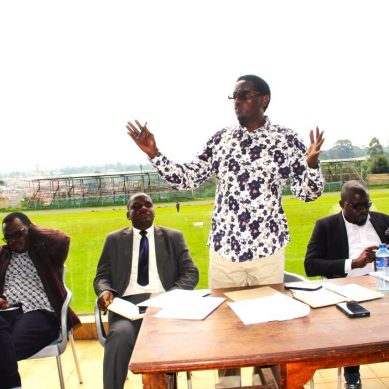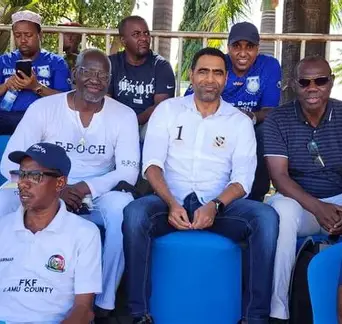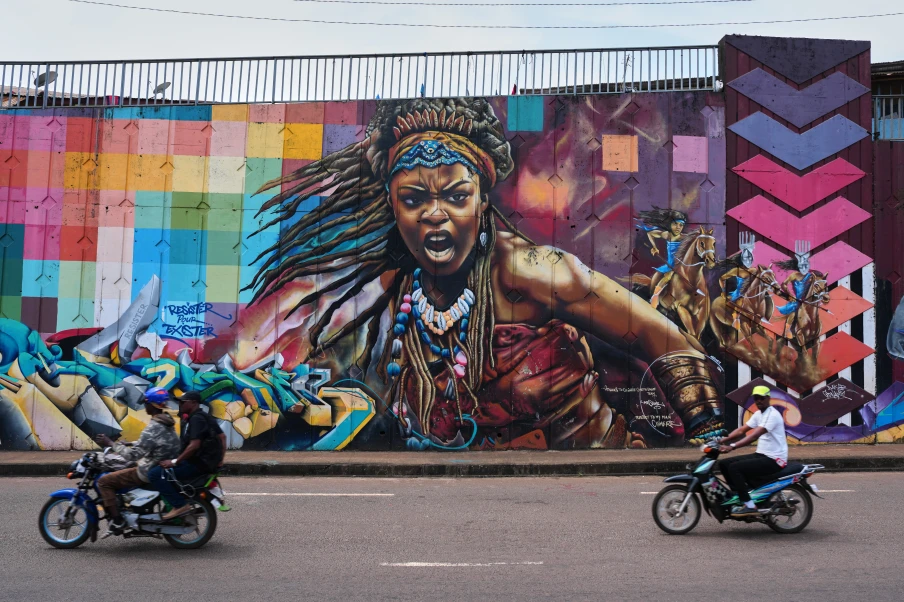
Joseph Kony’s son, Ali Ssalongo Kony, describes his motivation for eventually leaving as twofold: to build another life for himself and his children, and because of a conflict between his mother (who lived with the group in Kafia Kingi) and father. It is unclear what the conflict was about, but Ali perceived it as potentially life-threatening.
Speaking to Uganda Radio Network in an exclusive interview in Gulu City, in 2023 after his return Ali revealed that his father had become a threat to his life and her mother prompting his escape. He said his father had long been torturing his mother but he consistently defended her, a move that angered him leading to a sour relationship between them.
According to Ali, when he lost morale for work and distanced himself from his father, Kony grew very suspicious that his mother had brainwashed him.
“There has been a fight between my father and mother but I got sucked into their fight because I was like a defender, I like my mother and didn’t want anything bad to happen to her. He (Kony) realised later that I had low morale for work, and our connection in terms of exchanging ideas and talking like we did before also slowly started waning,” he explained.
Ali noted that a mix of feelings of fearing retaliation from his father and the need to offer his children a better life forced him to flee with his family into the neighbouring South Darfur in Sudan for safety.
He says he had for long thought about returning home but was discouraged by negative messages that those who returned home were killed or imprisoned.
Ali, once a blue-eyed boy to the notorious LRA warlord enjoyed top positions in the LRA including being the Chief of Security of Kony and the Coordination commander of the LRA and Sudanese allies. At his youthful age, Ali had gained enormous trust from his father as a fierce fighter, commander and LRA coordinator seeing him quickly grow in rank to a Brigadier.
However, in July 2021, Ali took a daring step to abandon his father’s rebellion campaign which he had been part of for nearly two decades.
The circumstances of his escape are still grey, although Ali said he and his family (which included four children, his wife and mother) slipped off secretly at night, leaving in small groups so as not to arouse suspicion.
Asked about his father’s health, Ali confirmed that his father had indeed been battling diabetes but noted that by the time he parted ways with him, he was physically fine.
“Pertaining his (Kony’s) health, when he left him, he was still okay, he walked, talked, and sat well but the weakness people have been suggesting is that he has diabetes. He had been very sick in the past but when he started using traditional herbs and conventional medicine, his health improved. Diabetes is the main ailment disturbing him currently, he is not as fit as in the past,” Ali responded.
Ali also revealed that by the time he escaped, his father had about 100 fighters including young children and women.
He says Kony currently practises commercial agriculture to feed his fighters, adding that the crops are later sold mainly to Mbororo pastoralists who roam between the Central African Republic, Sudan, and the Democratic Republic of Congo.
“During my time with him (Kony) until I left, he hadn’t been launching operations. However, there was farming, there were crops for the fighters to feed on and the surplus was sold to Mbororo herdsmen who moved from place to place from Congo, Darfur and the Central African Republic. Those herdsmen used to buy a lot of food from our camp and the money would be used to buy what we lacked,” Ali revealed.
Ali’s next steps were also unusual. Most ex-LRA members surrender to the local authorities in their place of defection, but Ali and his family instead travelled to a Darfuri town called Songo, only 80 kilometres from the base camp they had escaped.
Ali knew Songo well. It used to be an ordinary market area, but the discovery of gold in recent years had transformed it into a border boomtown. From the moment the LRA settled in Kafia Kingi, Ali and other LRA forces would travel there to trade.
Ali’s life in Songo echoed the one he had left behind. He traded gold and cannabis, acting as a middleman for both. He owned shops, farmed sorghum, groundnuts, and sesame nuts, and even worked as a taxi driver.
It is unclear how long Ali planned to stay in Songo (or if indeed he intended to leave), but his hand was forced: In April 2023, conflict erupted in Sudan between the Rapid Support Forces (a paramilitary group with a stronghold in Darfur) and the Sudanese army.
Ali and his family crossed into South Sudan, and started a long journey to the capital, Juba. “Along the way, we encountered many difficulties,” he recalled. “Where to sleep, how to pay for food; one of our children was sick with malaria.”
Weeks after arriving in Juba, his money exhausted, Ali went to the Ugandan embassy, where he presented himself as a businessman who had been working in Sudan rather than the son of Joseph Kony. The ploy worked and he obtained a travel permit.
Soon after, Ali was on the road to Gulu.
Ali was born in Gulu but brought to the LRA when he was six months old. From then on, he would hear about life in the town from his mother, and from other visitors who had come to meet the group in the bush during different peace talks with the Ugandan government.
His expectations of returning were high, as they are for many former LRA fighters: Their isolated existence often gives them an idealistic sense of what life will be like outside of the group.
When The New Humanitarian met Ali last year, however, he was in a kind of limbo, waiting for his life to restart in a rented house where electricity was unstable.
A few months earlier, Ali had been invited to Uganda President Yoweri Museveni’s state house and promised a range of benefits: 30 acres of land, a farm and houses for his family. “The president welcomed us, and told us to feel at home; he told us this is our country,” Ali said.
But the benefits didn’t materialise. Three months later Ali held a press conference appealing to Museveni to honour his word. His wife Selly (who is Congolese and was abducted by the LRA) said the family “sleep hungry or just survive on a meal per day”.
Ali’s experience is not unusual for former LRA fighters. While the group still holds a mythical status in Uganda and Museveni sees political capital in bringing ex-LRA home (or at least being seen to), he rarely comes through on his promises of support.
Although Uganda has an amnesty law for the group that reflects the generosity of Acholi society, former LRA members still face discrimination, with children seen in schools as troublemakers and women often struggling to marry or remarry.
Ali hasn’t faced discrimination, although he has struggled to adapt. “When I came back, I tried to adjust, but it was very hard,” he said. “In the LRA, I had things at my disposal… I had a high rank, and being a son of the top LRA commander, I had respect from other LRA.”
One livelihood option often available for defectors is to join the Ugandan army, which tends to see ex-LRA as disciplined fighters. In one interview, Ali suggested that wasn’t what he wanted (“I left the LRA because I was tired of military work,” he said) but after joining late last year he appeared satisfied by the benefits of a monthly salary.
Could a similar life be tempting to the other remaining LRA combatants? What about Ali’s father, of whom rumours of surrender talks occasionally surface (although they are often scams by entrepreneurial Acholi looking for a pay out from diplomats and NGOs)?
Ali said he does not know what is in their minds.
“Some may be afraid, because of some of the things they have been told about this government: that they will arrest you and put you in jail; and maybe you will get poisoned,” he said.
Still, Ali is confident in his choice.
“I looked deep and long,” he told The New Humanitarian. “I needed to go home”.
- A Tell report / By Kristof Titeca – a professor at the Institute of Development Policy at the University of Antwerp. Republished with the permission of The New Humanitarian.







